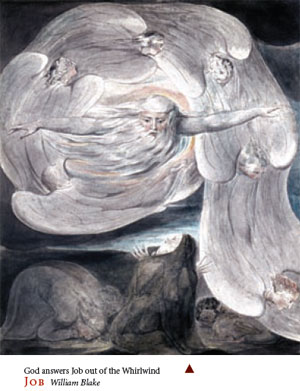Then God…
Lincoln E. Steed May/June 2006
Getting your Trinity Audio player ready...

Children seem to have an innate fascination with dinosaurs. I know this from my days as a book editor. Children's books on, about or illustrated with pictures of dinosaurs are instant sales stars. I know the appeal of dinosaurs firsthand now by way of my eight-year-old son. Christopher will spend hours at a clip delving into the secret life of dinosaurs. He is fascinated by details of their hunting, loves the way they look, is impressed by their strength, and is open to all the "facts" of their existence.
I read some of these books on dinosaurs myself. And it strikes me again and again how fanciful they are—how sure they are of what is often a guess applied to a theory. Were they warm or cold blooded? Scientists have shifted on that lately, without much evidence either way it seems. I now read how caring dinosaur parents were—the evidence I think comes from projecting our values anew on bones from the stone. And what did they really look like? There are times when I think the blind men and the elephant story is at work in the artists' renditions—after all, why not the feathered serpent look of a Quetzalcoatl rather than the totalitarian armor of a Godzilla?

The fact that our nominally Judeo-Christian culture does not presuppose God when it looks at the heavens and the earth tells me that we abandoned that mission somewhere around the time God was proclaimed dead—and that the sensors are now looking for inanimate objects.
The rub comes when an attempt is made to correct the Hubble mirror of our enquiry without changing the worldview. The result could easily be something like intelligent design theory.
In my Bible it says that "in six days God created the heavens and the earth and all that in them is." I don't expect everyone to buy that revealed truth, any more than I think the earth is held up on the back of four giant tortoises. But I can tell you that it is faint support indeed to premise a God/Designer who may have laid down the templates for things and then let them develop along the lines of evolutionary theory, over vast eons of time.
The Bible says that "he that cometh to God must first believe that He is." And of course that is true. It is in the vein of "I think, therefore I am." There is a required philosophical assumption both to posit God and to assume that we ourselves are anything beyond a shared abstraction. Even the pop philosophers of our day recognize the soggy soil of assumptions about reality: ergo films like "The Matrix."
If He exists, God must necessarily be more than an absent landlord—or worse, sending out misleading information in what proclaims itself as His revelation—the Bible. The reality of God argues for more than Intelligent Design—else we are at the very least heading back toward the very Deism which facilitated the rise of modern evolutionary thought.
The God of the six days of creation is far more than one of the backroom boys drawing templates for life—He must be the First Cause. The God of Sinai and the Ten Commandments came with thunder and lightening and His commands expected obedience. The God of Bethlehem was more than a Star in unusual orbit; He was the miracle of a Babe in the Manger. The risen Christ was a phantom to Thomas—until he reached out and touched the reality of God.
If not Creator in the grand biblical sense, then how are we to take seriously the Ten Commandments, for example. And as a Seventh-day Adventist, I must protest the importance of the 4th Commandment, which has as its point of reference the 7th Day after Creation—the Saturday Sabbath rest which is the memorial of God's creative power. Not specifically Jewish—as some have suggested—nor easily moved to another day, as others have wished.
In this issue you can read some of the developments in efforts to insert Intelligent Design into school curricula alongside teachings of evolution. So far the courts have rejected this blatant attempt to insert what amounts to a particular religious view into state indoctrination.
The First Amendment is intended to keep the state from projecting a particular form of religion. But it must be said that the teaching of evolution has by its very nature tended to undermine religious certainty—not just Judeo Christian norms, but particularly the norms that formed this nation's civil assumptions 200 years ago. And there is a very real danger in the state uncritically endorsing a scientific mindset that may have consciously set itself against spiritual norms.
A solution could come with the state holding scientific expression responsible for its worldview. The republic is betraying itself if it slips into promoting an antireligious mindset. We should require that state educators present evolution and other scientific philosophies as the works in process that they are—and in explaining their worldview, give information about and respect for other views, such as Biblical Creationism. We should go further and demand that in places other than science class, students are given adequate information about religious world views other than the so-called but very real Secular Humanism.
This magazine has always insisted on a separation of church and state as the best basis for continued religious freedom for all. But I see trouble for that paradigm in the escalating debate of evolution versus intelligent design. Too many people of faith are looking to intelligent design as a Trojan Horse to counter state support of a scientific worldview that has become overtly antireligious. They risk two very central things in this attempt. First, they are further contributing to the state sponsorship of religious views in demanding that intelligent design be taught as science. Second, in putting up a pseudo-science named intelligent design they of necessity will mute or deny specifics of the Biblical account and demean the very authority of the concept.


Lincoln E. Steed
Editor,
Liberty Magazine
Article Author: Lincoln E. Steed
Lincoln E. Steed is the editor of Liberty magazine, a 200,000 circulation religious liberty journal which is distributed to political leaders, judiciary, lawyers and other thought leaders in North America. He is additionally the host of the weekly 3ABN television show "The Liberty Insider," and the radio program "Lifequest Liberty."